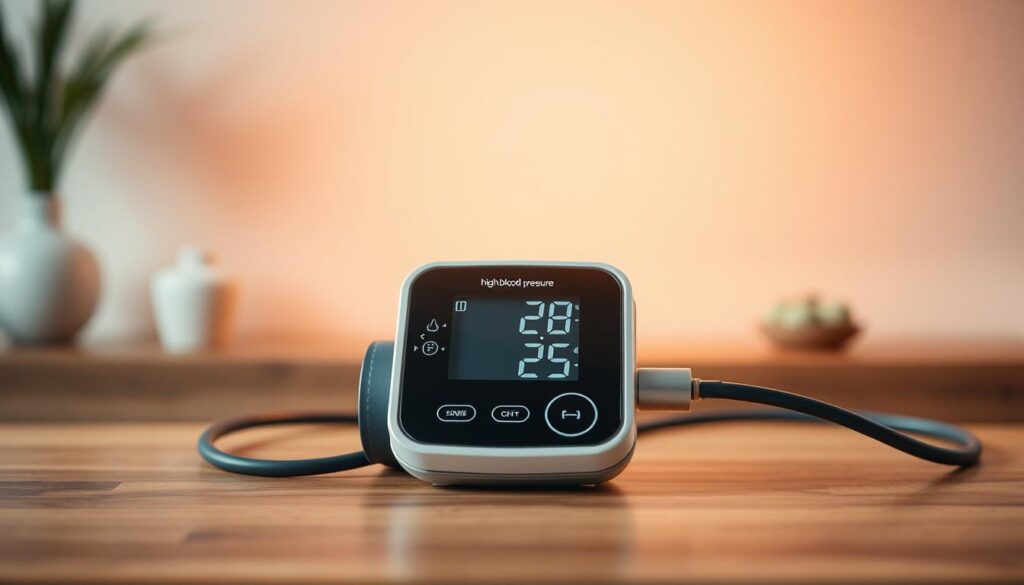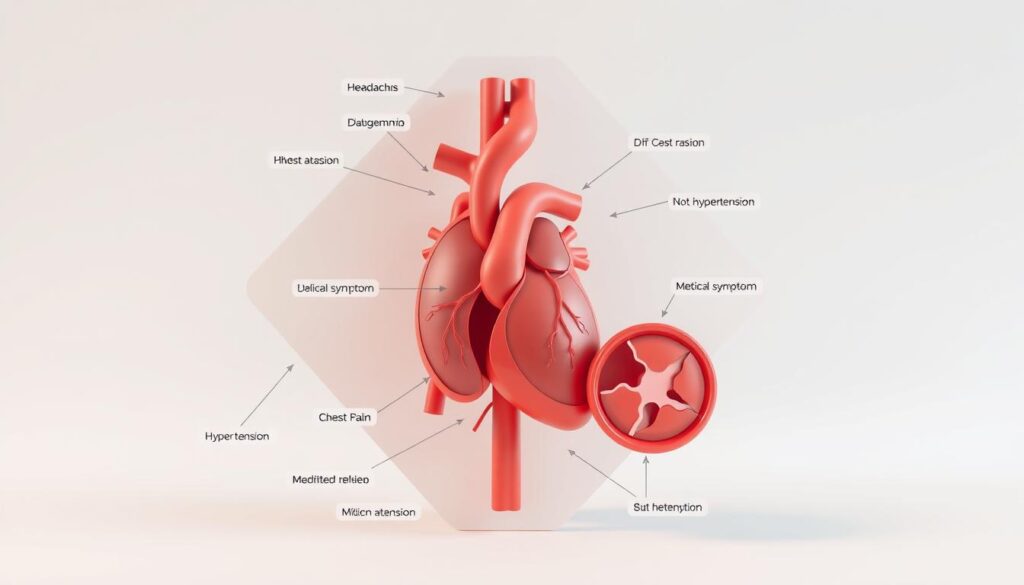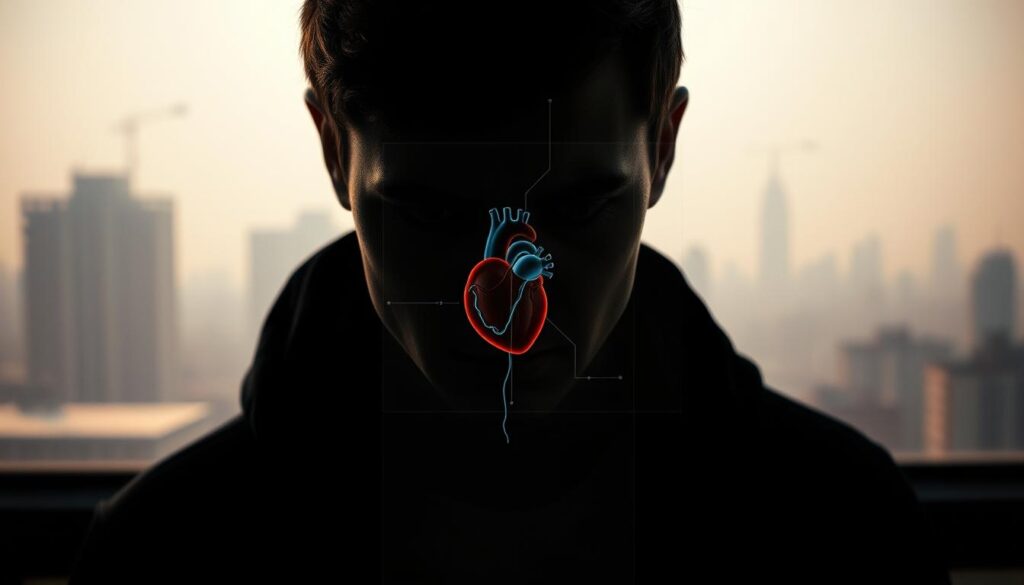Are you silently carrying a ticking time bomb inside your body? High blood pressure symptoms often go unnoticed. This makes it a dangerous silent killer that affects millions in India.
Understanding high blood pressure symptoms is key to protecting your health. Many people don’t notice any warning signs. But, persistent headaches might signal serious cardiovascular risks.
Spotting early symptoms of high blood pressure can prevent serious health issues. This guide will show you how to recognize red flags. It aims to empower you to take steps for better heart health.
We’ll look at the subtle signs and critical risk factors of hypertension. Whether you’re young or getting older, knowing what to watch for could save your life.
Let’s explore the important info that can help you manage your blood pressure well.
Understanding High Blood Pressure and Its Impact on Health
Blood pressure is key to heart health. It shows how hard your heart works to pump blood. Knowing about high blood pressure is vital to avoid health problems.

Starting treatment for high blood pressure means knowing the difference between normal and high readings. Doctors use certain numbers to spot hypertension and figure out risks.
Blood Pressure Range Classifications
| Blood Pressure Category | Systolic (mmHg) | Diastolic (mmHg) |
|---|---|---|
| Normal | Less than 120 | Less than 80 |
| Elevated | 120-129 | Less than 80 |
| Hypertension Stage 1 | 130-139 | 80-89 |
Why Blood Pressure Monitoring Matters
Checking blood pressure regularly is important. It helps find high blood pressure early in young adults. This can stop serious health problems later.
- Early detection prevents cardiovascular complications
- Helps track potential genetic predispositions
- Enables proactive lifestyle modifications
Risk Factors for Hypertension
Many things can lead to high blood pressure, even in young people. Genetic predisposition, stress, diet, and exercise are big factors.
- Family history of hypertension
- Sedentary lifestyle
- High sodium intake
- Chronic stress
- Obesity
Knowing these risk factors helps people take care of their heart health. It also helps them find the right treatment for high blood pressure.
Common High Blood Pressure Symptoms

It’s hard to spot high blood pressure symptoms because many people don’t show any obvious signs. Some folks might have high blood pressure for years without even realizing it.
Important symptoms to watch out for include:
- Persistent headaches that feel unusual or intense
- Frequent dizziness, specially when standing up fast
- Unexpected nosebleeds without a clear reason
- Shortness of breath when doing little physical activity
- Chest discomfort or mild pain
Dizziness is a big warning sign. If you often feel light-headed, it’s crucial to check your blood pressure. Also, random nosebleeds could mean you might have high blood pressure.
| Symptom | Potential Significance | Recommended Action |
|---|---|---|
| Persistent Headaches | Possible Hypertension Indicator | Consult Healthcare Professional |
| Frequent Dizziness | Blood Pressure Fluctuation | Regular Blood Pressure Checks |
| Unexpected Nosebleeds | Potential Vascular Stress | Medical Evaluation Recommended |
Even if you show these symptoms, they don’t mean you definitely have high blood pressure. The only sure way to know is through a doctor’s check-up.
Silent Symptoms and Warning Signs in Young Adults
High blood pressure can sneak up on young adults, showing little signs that are easy to miss. Knowing what causes it in young people is key to catching it early and avoiding health problems.

Young adults might notice small signs that point to heart risks. Spotting these signs early can help them take care of their health.
Early Detection Methods
- Regular blood pressure screenings
- Home monitoring devices
- Annual health check-ups
- Fitness tracking technology
Age-Specific Symptoms to Watch
Young adults should keep an eye out for these symptoms:
- Shortness of breath during mild physical activities
- Occasional chest pain or discomfort
- Persistent headaches
- Unexplained fatigue
When to Seek Medical Attention
| Symptom | Urgency Level | Recommended Action |
|---|---|---|
| Severe chest pain | High | Immediate medical consultation |
| Persistent shortness of breath | Medium | Schedule doctor’s appointment |
| Recurring headaches | Low | Discuss during next check-up |
Young adults should focus on their heart health. Stay informed, live a healthy lifestyle, and see a doctor if you notice anything odd.
Lifestyle Factors Affecting Blood Pressure Levels
Managing blood pressure is not just about medication. Your daily habits are key to controlling high blood pressure and preventing fatigue. Knowing how lifestyle choices affect your heart health can help you take action.
Several lifestyle factors directly affect blood pressure levels:
- Diet and nutrition choices
- Physical activity patterns
- Stress management techniques
- Sleep quality and duration
What you eat is crucial for treating high blood pressure. Eating less sodium, more potassium, and a balanced diet can greatly improve heart health. Whole grains, leafy vegetables, and lean proteins are vital for a healthy heart.
Exercise is also a powerful tool for managing blood pressure. It reduces fatigue, strengthens the heart, and boosts overall heart function. Aim for 150 minutes of moderate exercise each week for better results.
Small lifestyle changes can create substantial improvements in blood pressure management.
Stress and sleep patterns also impact blood pressure. Chronic stress can raise blood pressure and cause fatigue. Using relaxation techniques like meditation and deep breathing can help control blood pressure naturally. Also, keep a regular sleep schedule.
Natural Ways to Control High Blood Pressure
Managing high blood pressure needs a whole-body approach. This includes lifestyle changes and natural treatments. By making smart changes, people can tackle high blood pressure and lower risks of vision issues and irregular heartbeats.
Controlling hypertension involves several strategies. These work together to boost heart health.
Dietary Modifications
What you eat is key in controlling blood pressure. Important dietary tips include:
- Keep sodium intake under 2,300 mg daily
- Eat more foods high in potassium, like bananas and spinach
- Choose lean proteins and whole grains
- Drink less alcohol and caffeine
Exercise Recommendations
Regular exercise is vital for blood pressure management. It also lowers risks of vision problems and irregular heartbeats. Here are some exercise tips:
- Do 150 minutes of moderate aerobic activity each week
- Try activities like walking and swimming
- Do strength training 2-3 times a week
- Begin with easy workouts and slowly increase
Stress Reduction Techniques
Stress can raise blood pressure. Here are ways to manage stress:
- Practice meditation every day
- Do deep breathing exercises
- Keep a regular sleep schedule
- Try yoga or tai chi
| Technique | Frequency | Expected Benefit |
|---|---|---|
| Meditation | 15-20 minutes daily | Reduces stress, lowers blood pressure |
| Aerobic Exercise | 30 minutes, 5 days/week | Improves cardiovascular health |
| Balanced Diet | Continuous | Maintains healthy blood pressure |
Being consistent is crucial in managing high blood pressure naturally. Always talk to a healthcare professional before making big lifestyle changes.
Conclusion
Managing high blood pressure symptoms is key to heart health. Spotting early signs can prevent serious health issues. By listening to your body and acting fast, you can keep your blood pressure in check.
Every person’s fight against high blood pressure is unique. It involves making lifestyle changes, eating right, and sometimes, medical help. Keeping an eye on your blood pressure, managing stress, and exercising regularly are vital for all ages.
Knowing and acting on high blood pressure information is empowering. In India, where more people are getting hypertension, it’s crucial to understand the symptoms. By staying informed, talking to doctors, and taking preventive steps, you can safeguard your heart health and lower risks.
Your health is a valuable asset. By focusing on blood pressure management, living a healthy lifestyle, and getting regular check-ups, you can beat hypertension. This way, you can enjoy an active and fulfilling life.
FAQ
What are the most common symptoms of high blood pressure?
High blood pressure often has no symptoms. But, some signs include headaches, dizziness, and nosebleeds. You might also feel short of breath, have chest pain, vision problems, or feel very tired. Many people don’t show any symptoms, making it a silent killer.
Can young adults develop high blood pressure?
Yes, young adults can get high blood pressure. It’s caused by stress, bad diet, not exercising, being overweight, and family history. It’s important for young people to check their blood pressure and live a healthy lifestyle.
How often should I check my blood pressure?
Adults over 18 should get their blood pressure checked every two years. If you have risk factors or high readings before, your doctor might want you to check more often.
What causes high blood pressure in young adults?
High blood pressure in young adults comes from unhealthy diet, not moving enough, drinking too much alcohol, and smoking. Stress, being overweight, family history, and medical conditions also play a part.
Are there natural ways to control high blood pressure?
Yes! Eating a balanced diet with fruits and veggies, cutting down on salt, and exercising help. Managing stress with meditation or yoga, drinking less alcohol, quitting smoking, and keeping a healthy weight also work.
When should I seek medical attention for potential high blood pressure?
See a doctor if you have severe headaches, chest pain, vision issues, or an irregular heartbeat. Also, if your blood pressure is always over 130/80 mmHg, get checked.
Can stress really affect my blood pressure?
Yes! Stress can raise your heart rate and narrow blood vessels. Long-term stress can lead to high blood pressure and heart problems.
What diet modifications can help manage high blood pressure?
Try the DASH diet, which focuses on fruits, veggies, whole grains, lean proteins, and low-fat dairy. Cut down on salt, eat more potassium-rich foods, and avoid processed and fatty foods.
Are there any warning signs of a hypertensive crisis?
A hypertensive crisis can cause severe headaches, anxiety, shortness of breath, nosebleeds, and chest pain. If you have vision problems or confusion, get help right away.
Can medications help control high blood pressure?
Yes, there are medicines like diuretics, ACE inhibitors, beta-blockers, and calcium channel blockers. Always talk to a doctor to find the right treatment for you.
